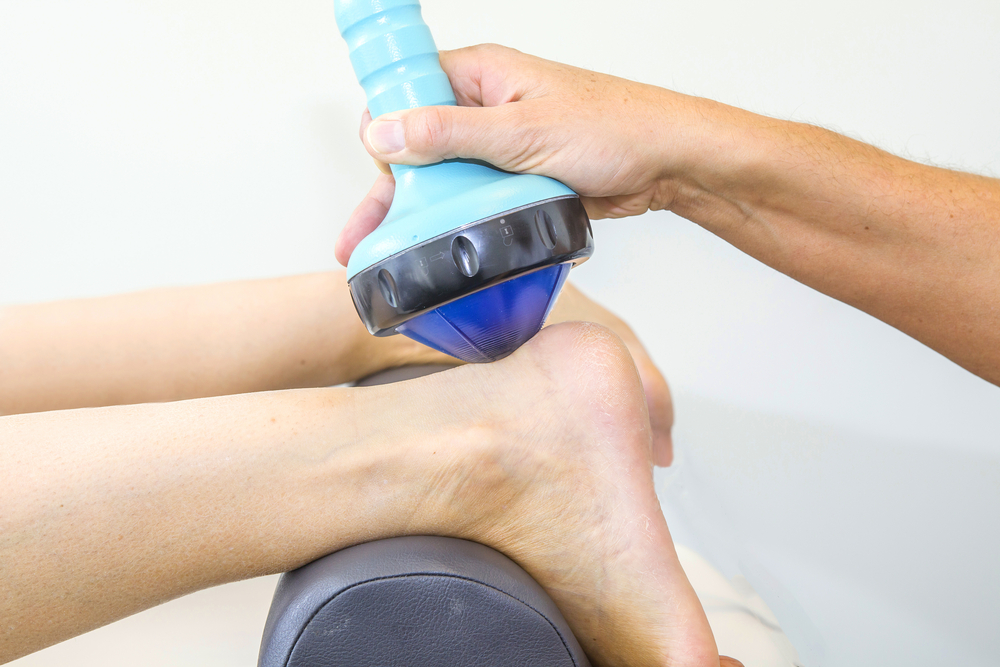Connect With Us
Blog
 The medical procedure that is known as shockwave therapy can be helpful in treating conditions that can affect the tissues and bones in the feet. Some of the ailments that can be treated can include plantar fasciitis, Achilles tendon injuries, and heel spurs. It is administered using low energy sound waves, and can easily penetrate the skin when an ultrasound gel is used. It is considered to be a non-invasive treatment for specific foot conditions, and many patients have little or no discomfort while undergoing this type of procedure. If you are afflicted with these foot conditions, it is recommended that you speak to a podiatrist who can determine if this is the best course of treatment for you.
The medical procedure that is known as shockwave therapy can be helpful in treating conditions that can affect the tissues and bones in the feet. Some of the ailments that can be treated can include plantar fasciitis, Achilles tendon injuries, and heel spurs. It is administered using low energy sound waves, and can easily penetrate the skin when an ultrasound gel is used. It is considered to be a non-invasive treatment for specific foot conditions, and many patients have little or no discomfort while undergoing this type of procedure. If you are afflicted with these foot conditions, it is recommended that you speak to a podiatrist who can determine if this is the best course of treatment for you.
Shockwave therapy is a treatment commonly used to treat various injuries and conditions, particularly plantar fasciitis in the feet. To learn more, consult with Dr. Yeon A. Shim from Roselle Podiatry Group. Our doctor can provide the care you need to keep you pain-free and on your feet.
Shockwave Therapy
Shockwave therapy is a new treatment option designed to treat bone conditions such as tennis elbow, shoulder pain, and others. Shockwave therapy uses high intensity sound waves that are directed to the affected tissues of the body with pinpoint accuracy. The effects are very beneficial, leading to a production of collagen fibers, eliminating inflammation.
Who Benefits from Shockwave?
Shockwave is recommended for patients suffering from heel pain and associated problems. Heel pain is a common condition which can be caused by obesity, overexertion, and spending a substantial amount of time on hard floors with your feet exposed and unsupported.
Fast and Easy
The therapy is actually a simple process that can leave patients feeling better the very next day. Shockwave therapy is not as dramatic as it sounds. It enables more blood flow to effected areas, addressing the source of the problem and allowing treatment to last for a long time.
Treatment & Recovery Time
Shockwave treatment will enable your feet to recover quickly. This is especially important since surgery is not required. It is cost effective and does not require the use of anesthesia. This treatment is a better option to surgery, since it is proven safe.
If you have any questions, please feel free to contact our office located in Roselle, NJ . We offer the newest diagnostic and treatment technologies for all your foot and ankle needs.
Read more about Shockwave Therapy Being overweight or obese can put you at risk for a variety of health conditions, but did you know that it can also increase your risk of foot pain? Being overweight or obese puts extra pressure on your feet, potentially leading to strains, sprains, fallen arches, and a host of other foot and ankle problems. Furthermore, being overweight or obese increases your risk of developing diabetes, peripheral neuropathy, and peripheral artery disease, which are all associated with foot health problems, such as diabetic foot ulcers, loss of sensation, and poor circulation. Eating a balanced diet and regularly exercising can improve your overall health. Maintain your daily foot health by wearing padded socks and shoes to avoid injury to the feet, practicing good foot hygiene, and checking your feet regularly for cuts and bruises. Regular visits to a podiatrist can also help spot potential problems and prevent future ones. If you are experiencing foot pain, or want to learn more about what you can do to keep your feet healthy, consult with a podiatrist today.
Being overweight or obese can put you at risk for a variety of health conditions, but did you know that it can also increase your risk of foot pain? Being overweight or obese puts extra pressure on your feet, potentially leading to strains, sprains, fallen arches, and a host of other foot and ankle problems. Furthermore, being overweight or obese increases your risk of developing diabetes, peripheral neuropathy, and peripheral artery disease, which are all associated with foot health problems, such as diabetic foot ulcers, loss of sensation, and poor circulation. Eating a balanced diet and regularly exercising can improve your overall health. Maintain your daily foot health by wearing padded socks and shoes to avoid injury to the feet, practicing good foot hygiene, and checking your feet regularly for cuts and bruises. Regular visits to a podiatrist can also help spot potential problems and prevent future ones. If you are experiencing foot pain, or want to learn more about what you can do to keep your feet healthy, consult with a podiatrist today.
The more you weigh, the harder your feet must work to support your body. If you’re an obese individual and are concerned about your feet, contact Dr. Yeon A. Shim from Roselle Podiatry Group. Our doctor can provide the care you need to keep you pain-free and on your feet.
Obesity and Your Feet
People who are overweight are putting more pressure on their ankles, knees, and hips as well as their feet. This unfortunately can lead to variety of different issues.
Problems & Complications Stemming from Obesity
- When the body is overweight, it tries to compensate by changing the way that it moves. An obese person may lean forward and put extra weight on the wrong part of the foot. This puts unnecessary stress on the feet.
- Obese people are also more likely to develop type II diabetes which is a condition that causes a lot of foot problems. People with diabetes often don’t feel the cuts and sores that they may have on their feet, which can lead to more complicated and severe issues.
- Plantar fasciitis is another foot condition that can be caused by obesity. Plantar fasciitis is an inflammation of the tissue along the bottom of the foot, which causes pain and stiffness while walking and climbing stairs.
If you have any questions, please feel free to contact our office located in Roselle, NJ . We offer the newest diagnostic and treatment technologies for all your foot care needs.
 Foot reconstruction is a type of surgery that is performed to correct the anatomy of the foot and restore proper function. Someone might need reconstructive foot surgery following a major injury to the foot that affects the foot’s soft tissue or bones. Vascular diseases, which can interfere with circulation in the lower limbs, may require surgical intervention. Other issues which can cause deformities include metabolic diseases, such as diabetes and gout, that alter the blood and nerve supply of the foot, and tumors. Finally, birth defects such as clubfoot would also need to be corrected via reconstructive surgery. For more information on reconstructive foot surgery, please consult with a podiatrist.
Foot reconstruction is a type of surgery that is performed to correct the anatomy of the foot and restore proper function. Someone might need reconstructive foot surgery following a major injury to the foot that affects the foot’s soft tissue or bones. Vascular diseases, which can interfere with circulation in the lower limbs, may require surgical intervention. Other issues which can cause deformities include metabolic diseases, such as diabetes and gout, that alter the blood and nerve supply of the foot, and tumors. Finally, birth defects such as clubfoot would also need to be corrected via reconstructive surgery. For more information on reconstructive foot surgery, please consult with a podiatrist.
Foot surgery is sometimes necessary to treat a foot ailment. To learn more, contact Dr. Yeon A. Shim of Roselle Podiatry Group. Our doctor will assist you with all of your foot and ankle needs.
When Is Surgery Necessary?
Foot and ankle surgery is generally reserved for cases in which less invasive, conservative procedures have failed to alleviate the problem. Some of the cases in which surgery may be necessary include:
- Removing foot deformities like bunions and bone spurs
- Severe arthritis that has caused bone issues
- Cosmetic reconstruction
What Types of Surgery Are There?
The type of surgery you receive will depend on the nature of the problem you have. Some of the possible surgeries include:
- Bunionectomy for painful bunions
- Surgical fusion for realignment of bones
- Neuropathy decompression surgery to treat nerve damage
Benefits of Surgery
Although surgery is usually a last resort, it can provide more complete pain relief compared to non-surgical methods and may allow you to finally resume full activity.
Surgical techniques have also become increasingly sophisticated. Techniques like endoscopic surgery allow for smaller incisions and faster recovery times.
If you have any questions please feel free to contact our office located in Roselle, NJ . We offer the newest diagnostic and treatment technologies for all your foot and ankle needs.

